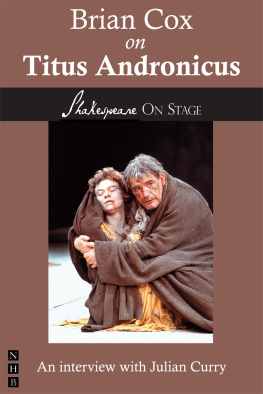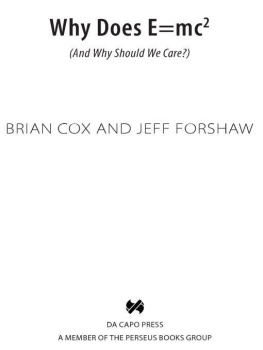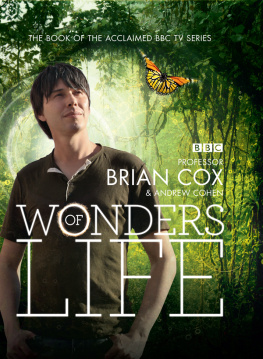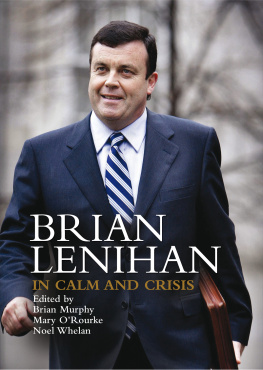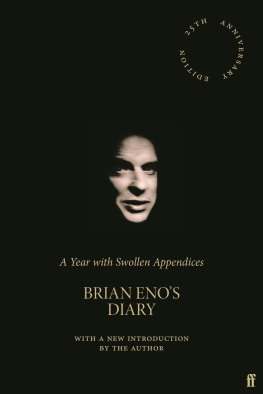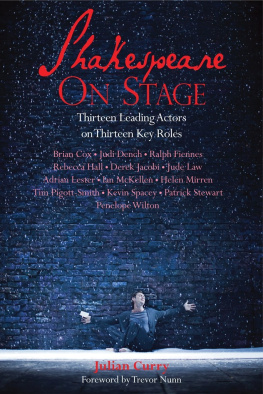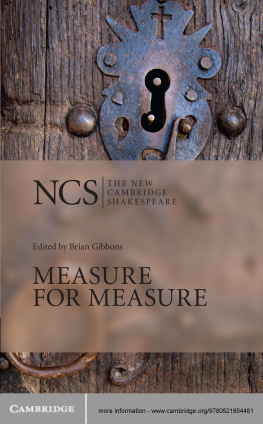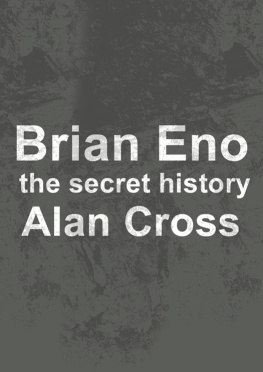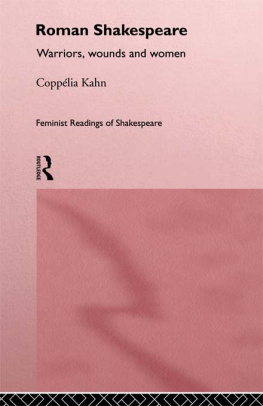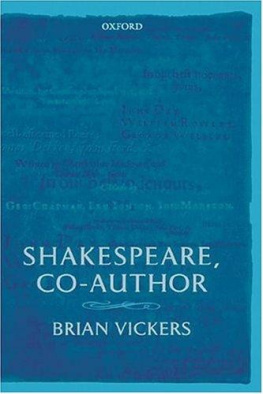Brian Cox - Brian Cox on Titus Andronicus; Shakespeare on Stage
Here you can read online Brian Cox - Brian Cox on Titus Andronicus; Shakespeare on Stage full text of the book (entire story) in english for free. Download pdf and epub, get meaning, cover and reviews about this ebook. year: 2013, publisher: Nick Hern Books, genre: Art. Description of the work, (preface) as well as reviews are available. Best literature library LitArk.com created for fans of good reading and offers a wide selection of genres:
Romance novel
Science fiction
Adventure
Detective
Science
History
Home and family
Prose
Art
Politics
Computer
Non-fiction
Religion
Business
Children
Humor
Choose a favorite category and find really read worthwhile books. Enjoy immersion in the world of imagination, feel the emotions of the characters or learn something new for yourself, make an fascinating discovery.
Brian Cox on Titus Andronicus; Shakespeare on Stage: summary, description and annotation
We offer to read an annotation, description, summary or preface (depends on what the author of the book "Brian Cox on Titus Andronicus; Shakespeare on Stage" wrote himself). If you haven't found the necessary information about the book — write in the comments, we will try to find it.
Brian Cox on Titus Andronicus; Shakespeare on Stage — read online for free the complete book (whole text) full work
Below is the text of the book, divided by pages. System saving the place of the last page read, allows you to conveniently read the book "Brian Cox on Titus Andronicus; Shakespeare on Stage" online for free, without having to search again every time where you left off. Put a bookmark, and you can go to the page where you finished reading at any time.
Font size:
Interval:
Bookmark:
Brian Cox
on
Titus Andronicus
Taken from
SHAKESPEARE ON STAGE
Thirteen Leading Actors on Thirteen Key Roles
by Julian Curry

NICK HERN BOOKS
London
www.nickhernbooks.co.uk
Brian Cox
on
Titus Andronicus
Titus Andronicus (15912)
Royal Shakespeare Company
Opened at the Swan Theatre, Stratford-upon-Avon, on 12 May 1987
Directed by Deborah Warner
Designed by Isabella Bywater
With Jim Hooper as Saturninus, Estelle Kohler as Tamora, Peter Polycarpou as Aaron, and Sonia Ritter as Lavinia
T he whirligig of time has brought about vivid changes in attitudes to Titus Andronicus. Shakespeares earliest tragedy, first performed in 1594, is by far his most bloodthirsty work. Its a heady brew a story of revenge and political turmoil, full of appalling brutality, featuring multiple murders, rape, mutilation and human sacrifice. The horrors are leavened by a vein of black comedy, as for instance when two characters meet their end by being baked in a pie. The play was hugely successful in Shakespeares time, but for centuries Titus was written off as a sensationalist example of the blood-spattered drama that was popular in the 1590s. The critic John Dover Wilson likened it to some broken-down cart, laden with bleeding corpses from the Elizabethan scaffold, while T.S. Eliot went one better, describing Titus as one of the stupidest and most uninspired plays ever written. However, critics have recently taken Titus Andronicus more seriously, largely on account of its various themes which presage Shakespeares greater plays. Like Coriolanus, Titus turns against his native Rome. Like Macbeth, he becomes dehumanised. Like Lear, he divests himself of power in the first scene. And foreshadowing Hamlet, Titus appears to go mad with grief, but leaves us unsure of the extent to which his madness is genuine.
Robert Atkins 1923 staging at the Old Vic was the first revival of a fully unexpurgated text for two hundred and fifty years. It caused audience members to faint. Peter Brooks famous production in 1955 starring Laurence Olivier was a major turning point in the plays popularity. Titus Andronicus was again a tremendous success with Brian Coxs performance in Deborah Warners 1987 RSC staging in the Swan Theatre, Stratford-upon-Avon. It was hailed as one of the greatest Shakespeare revivals of the 1980s. When working out a wish list of performances I hoped to include in this book, Coxs Titus was a leading contender. I was stunned by it. A play which is most certainly not normally considered one of Shakespeares best was made plausible, contemporary and extremely hot. I talked to Brian on a pleasant morning in 2006, sitting outside a pub in Camden Town, with only occasional interference from a passing helicopter.
Julian Curry: Titus Andronicus is a play full of harshness and horror. It confronts bloody revenge, dismemberment, rape, cannibalism and murder. Titus opens the action by killing one of his sons and closes it by slaughtering his already maimed daughter. In the intervening acts, hands and tongues are cut off almost at random before doting parents eat their own offspring served up in pies. How can we take this seriously?
Brian Cox: Well, I dont think, especially nowadays, we have to look too far for the horror. But youve got to remember that Titus is written by a young Shakespeare. Its written by a Shakespeare who around the same time wrote Richard III. Its all about authority and those who become disconnected from reality, so it has a young mans rebellious nature. Titus is an old fart who forgets what hes there for in the first place. He had twenty-five sons, twenty-one have been killed in battle, and its only when hes down to four that he realises that hes lost most of his children, in horrific circumstances. And he has suffered accordingly. Hes become brutalised, hes maimed. He has served his idol, Rome, for so long, unquestioningly, and has been away for so long fighting the wars, that hes forgotten the corruption at home. And its only when he finally comes home that the corruption brings all things closer.
The Emperor Saturninus immediately takes his prize, Tamora the Goth, and does the unthinkable by marrying her. So suddenly her boys are elevated, and his one-time captives are now princes of the realm. There are so many modern versions of that, political plays where groups of people take over from other groups of people, and they combine to get into bed together. And these are the last people to get into bed with, to shore up a state which is already crumbling, as Rome is. But Titus is old-fashioned you know, No questions asked. Do your duty. Serve. Rome is his great master.
Shakespeare tries out a lot of ideas in Titus Andronicus that he later develops in other plays, like Othello, like Lear, like Coriolanus. There are lots of themes in those plays which are reiterated. I think its a truly great play, and not very well understood, because he does it under the guise of extremely black humour. Now most productions in the past even Peter Brooks production cut a lot of the laughs because they thought they were detrimental to the play. But I think the laughter in that play is absolutely vital. If you take the masks of comedy and tragedy, and put them together, you create another mask which is ludicrousness. The state of ludicrousness. And life as we look at it now we look at Iraq, and we look at whats happening since Saddam Hussein has gone. The insurgency outstrips the IRA by a mile. Its a brutalised situation. But its ludicrous, its hysterical, its ridiculous. And I think thats what Shakespeares touching on. Those are the themes he touches on very carefully in the play. He deals with them so that, point/counterpoint, one ludicrous act follows another ludicrous act, so its all about shocking, shocking, shocking. And its very twentieth-century, its very Artaud, its very Theatre of Cruelty. You look at Brook, you look at Brooks development. You can see how a play like Titus would start him thinking about emotional Theatre of Cruelty which then, seven years later, he does at the LAMDA Theatre. And he starts his French-based theatre company. I think thats very much based on what comes out of Titus Andronicus. In a way he couldnt really do justice to Titus, because the main stage wouldnt allow it at the time. So it was very stylised. And although Olivier, I think, managed to sneak in a few of the jokes, most of them were excised.
Youve written about the image of Archie Rice [in John Osbornes The Entertainer] being much more vivid than the image of Hamlet. What did you mean by that?
I think theres the performing element with Titus.
You think hes an actor?
Yeah. Because he has to pretend, which again anticipates Hamlet in feigning madness. How much does he feign madness, and how mad is he? I think hes so far gone that hes mad, nor-nor-west. He does know a hawk from a handsaw, but he is kind of motoring, he uses his madness. First of all he uses it to seduce Tamora, and also to seduce the boys and win the boys confidence, and then finally to murder them and bake them in the pies, and set them up for the mother. Now thats a mad, brutal act.
Youre talking about the end of the play. Do you think he was mad earlier on?
Oh yeah. I think he realises his own insanity after the rape. The most incredible poetic piece is I am the sea, after his daughter has come out ravished, with her hands cut off and her tongue cut out. Shes the only female in that world, theyre all sons except for this one girl who is brutalised. Then of course at the end of that scene they bring on the heads of his sons. And suddenly his connection for family, which hes not made before, all comes at once. So theres a shock value like in a great Ibsen tragedy, that promotes something extraordinary. Its like Titus crying, and his tears melt the snow that brings down the ice that creates the avalanche. When finally he cries, it kills him. So the final part of his destiny is set in progress. And thats whats so extraordinary about the play, that he motors towards this diabolic end, but taking everything down with him, taking all the fabric of what is a corrupt society with him. Its a fascinating play, because I think that Shakespeare, as a young writer, is dealing with things in a way that is offbeat. The reason why the play seems to lack cohesion is that people cant accept the humour. They have difficulty with the humour. And that makes them go Oh, its not really a very good play, because its a farce. But actually its the humour, its the black humour that is cohesive, its the glue of the play.
Next pageFont size:
Interval:
Bookmark:
Similar books «Brian Cox on Titus Andronicus; Shakespeare on Stage»
Look at similar books to Brian Cox on Titus Andronicus; Shakespeare on Stage. We have selected literature similar in name and meaning in the hope of providing readers with more options to find new, interesting, not yet read works.
Discussion, reviews of the book Brian Cox on Titus Andronicus; Shakespeare on Stage and just readers' own opinions. Leave your comments, write what you think about the work, its meaning or the main characters. Specify what exactly you liked and what you didn't like, and why you think so.

